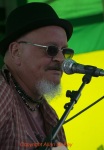 It’s difficult enough working out where to start a Phil Burdett review at the best of times without having to contend with an album that doesn’t actually start or finish anywhere. The clue’s in the song title “Sisyphus on Denmark Street”; the songwriter condemned forever to push a stone uphill. It could be worse; look what they did to Prometheus. The album cycles continuously from the birth of the dawn in “Net of Joy” to the dusk and senescence of “Dotage Train” and back to the beginning again, linked by the phrase ‘heavy miles to go’ in each song. Reincarnation without any upward or downward mobility and inspiration from the unholy poetic trilogy of William Blake, John Clare and Arthur Rimbaud.
It’s difficult enough working out where to start a Phil Burdett review at the best of times without having to contend with an album that doesn’t actually start or finish anywhere. The clue’s in the song title “Sisyphus on Denmark Street”; the songwriter condemned forever to push a stone uphill. It could be worse; look what they did to Prometheus. The album cycles continuously from the birth of the dawn in “Net of Joy” to the dusk and senescence of “Dotage Train” and back to the beginning again, linked by the phrase ‘heavy miles to go’ in each song. Reincarnation without any upward or downward mobility and inspiration from the unholy poetic trilogy of William Blake, John Clare and Arthur Rimbaud.
If you’re part of the generation that doesn’t listen to albums, this isn’t for you; “Psychopastoral” is designed to be heard in a certain order, start to finish and then again and maybe once more, just to be sure that it is actually a work of genius. Phil’s taken a simple approach to ensuring we listen to everything in the intended order; the entire album’s one track with songs connected by musical and lyrical fragments. Does it work? Bloody right it does; at just under an hour, the images, fragments and melodies rush past at breakneck speed then start all over again bringing fresh musical and verbal marvels to discover.
I could spend hours going into minute detail about every aspect of this album, but that’s not going to help anyone, so I’ll try to pick out some of the attention to detail that permeates every aspect of this beautiful piece of work. How about the musicians? The core of this ensemble has been with Phil for a few years now and each one brings their own individual talents to a great ensemble sound. John Bennett (guitar) is one of my local heroes; comparisons with Steve Cropper are more than justified – not showy, but everything fits perfectly. Steve Stott adds colour and texture with bright mandolin and melancholy fiddle and Colleen McCarthy’s backing and lead vocals are a pure and clear foil for Phil’s soulful growl. And of course, Russ Strothard’s melodic bass playing, Lyndon Morgan’s spoken word contributions and the samples and programming contributed by Al Franklinos.
Phil’s voice sounds as good as I’ve ever heard it and the words are as densely packed with meaning and allusion as ever. I’m not going to bore you with my amateur literary criticism, you can delve into the layers of meaning for yourself (there’s a lyric booklet as part of the CD package); you’ll find it packed with autobiographical references both pleasurable and painful alongside the odd skewed musical reference (‘needles of death and the damaged rum’ from “Sisyphus on Denmark Street”).
I’m a huge admirer of Phil’s work, particularly from “Dunfearing and the West Country High” onwards and with “Psychopastoral”, he’s made an unflinching, uncompromising album that flies in the face of convention in its stance on sequencing and playback. There are some memorably catchy songs embedded in the piece, and Phil’s determined that they stay embedded and we hear them as part of the overall creation. It’s an ambitious project, but it’s perfect in every little detail. Favourite album of the year so far? I think so.
“Psychopastoral” is out now you; can order it direct from Phil’s website.
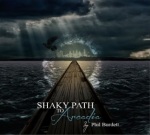 Every time I hear some delusional, no-talent wannabe on a TV talent show (not often, I admit) it should make me despair for music in the twenty-first century. The reason it doesn’t is that I know about people like Phil Burdett, a genuine visionary who’s about as far as it’s possible to get from the epicentre of what masquerades as the music business today. When I interviewed Phil about eighteen months ago in downtown Leigh-on-Sea, he told me that he was working an album to follow “Dunfearing and the West Country High” as the second part of the “Secular Mystic Trilogy”. Not only that but he was also working on another trilogy that would begin with “Humble Ardour Refrains”. So, on a budget of threepence-halfpenny and some lollipop sticks, he’s recorded two albums for Drumfire Records with some fabulous musicians from the Southend and Canvey area (more about the musicians later) and he’s releasing both of them at the same time.
Every time I hear some delusional, no-talent wannabe on a TV talent show (not often, I admit) it should make me despair for music in the twenty-first century. The reason it doesn’t is that I know about people like Phil Burdett, a genuine visionary who’s about as far as it’s possible to get from the epicentre of what masquerades as the music business today. When I interviewed Phil about eighteen months ago in downtown Leigh-on-Sea, he told me that he was working an album to follow “Dunfearing and the West Country High” as the second part of the “Secular Mystic Trilogy”. Not only that but he was also working on another trilogy that would begin with “Humble Ardour Refrains”. So, on a budget of threepence-halfpenny and some lollipop sticks, he’s recorded two albums for Drumfire Records with some fabulous musicians from the Southend and Canvey area (more about the musicians later) and he’s releasing both of them at the same time.
“Shaky Path to Arcadia” carries on where its predecessor left off, looking west towards the USA from Cornwall, but it’s a metaphorical and musical destination and it’s not the only direction the album goes in, geographically or temporally, before returning to Cornwall to complete the cycle. Without slipping in to ‘sixth-form-literary-criticism’ mode, I’m going to say that there’s a lot going on lyrically and the deeper you dig, the more precious stones you’ll unearth. The lyrics are strewn with references to American music and culture; there’s no mistaking the reference point for “Christmas in Casablanca”, but elsewhere there are references to Joe Hill, Billie Holiday, Dylan, Little Richard and many, many more. There are Dadaist references, travel references (trains, boats and buses and almost a plane) and if you look really closely, a lot of references to Basildon. There’s a lot of autobiography in there, but you need to know where and how to look.
Even without the lyrical content, you could listen to the album and be enthralled by Phil’s rich, powerful vocals and the performances of the band over a wide range of styles. From the mainly acoustic opening song, “Returning to Earth” to the counterpoint vocals in the coda of the album’s closer “I Dreamed I Saw Carl Wilson Last Night”, the band sounds superb. It’s ensemble playing at its finest; particularly on “Hellbound & Innocent” where a melodic bass line from Russ Strothard, an insanely catchy clipped John Bennett guitar hook and Jack Corder’s drums recreate the clickety-clack of the train on the track to perfection. Dee Hunter’s piano is the perfect foil for Phil’s voice on the haunting “Christmas in Casablanca” while Steve Stott’s fiddle on “Come Out Without a Hat (It’s Bound to Rain)” and “New Greyhound Rag” give an authentic country/bluegrass feel to the songs. And let’s not forget Colleen McCarthy’s lovely backing vocals and producer Mark Elliott’s esoteric samples.
“Shaky Path to Arcadia” is an example of how good an album can be when it’s put together by people who love what they do and they do it very, very well. Put the players together with another superb set of songs from the polymath poet of Westcliff-on-Sea and you’ve got a very fine album indeed. Any proper record collection should have some Phil Burdett in it and this is as good a place as any to start. “Humble Ardour Refrains” coming soon.
“Shaky Path to Arcadia” and “Humble Ardour Refrains” are both available to pre-order now from Drumfire Records.
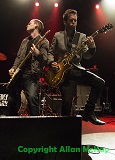 So, on to the second part of our mid-term report, and it kicks off with a band that the Riot Squad saw live a couple of times last year. Federal Charm released their debut album in 2013 and have been on the circuit trying to reach as many people as possible with their melodic blues/rock. This year they’ve also been recording their second album which is ready for release in the Autumn to coincide with a major support tour with Joanne Shaw Taylor in September and October. We’re looking forward to reviewing the new album and the live shows will definitely be worth seeing.
So, on to the second part of our mid-term report, and it kicks off with a band that the Riot Squad saw live a couple of times last year. Federal Charm released their debut album in 2013 and have been on the circuit trying to reach as many people as possible with their melodic blues/rock. This year they’ve also been recording their second album which is ready for release in the Autumn to coincide with a major support tour with Joanne Shaw Taylor in September and October. We’re looking forward to reviewing the new album and the live shows will definitely be worth seeing.
Phil Burdett’s album “Dunfearing and the West Country High” (again from Drumfire Records) was another MusicRiot favourite last year. It was the first part of Phil’s “Secular Mystic” trilogy, and a work of rare beauty. The second part of the trilogy, “Shaky Path to Arcadia”, is due to be released in late summer/autumn 2015 and based on the songs that the Riot Squad have heard so far at a couple of gigs in Southend and Leigh-on-Sea, this is shaping up to be another classic. There’s also the first part of an acoustic trilogy which may be released later this year, but we’ll tell you more about that later.
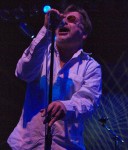 Did we feature anyone from New Jersey? We did? Now that’s a surprise. Southside Johnny and the Asbury Jukes have a new album which should be released later this year and that’s always something we look forward to here at Riot Towers. The album’s called “Soultime!” and the band has been previewing some of the songs at shows over the summer in the States; apparently they’re sounding pretty good. The one snippet we’ve heard from the live shows, “Spinning”, sounds like The Jukes at their very best with the band cooking on gas and the horns blowing up an absolute storm.
Did we feature anyone from New Jersey? We did? Now that’s a surprise. Southside Johnny and the Asbury Jukes have a new album which should be released later this year and that’s always something we look forward to here at Riot Towers. The album’s called “Soultime!” and the band has been previewing some of the songs at shows over the summer in the States; apparently they’re sounding pretty good. The one snippet we’ve heard from the live shows, “Spinning”, sounds like The Jukes at their very best with the band cooking on gas and the horns blowing up an absolute storm.
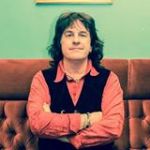 Bob Malone’s also from New Jersey, although he lives in California these days. We reviewed the “Mojo EP”, which was a sampler for his “Mojo Deluxe” album, last year. After a year of touring the States with John Fogerty and Europe with his own band, “Mojo Deluxe” is just about ready to go and he’ll be touring the UK later this year in support of the album. If the album lives up to the standards set by the EP, it should be a little bit special. As for the live shows, you really should get along to see one of those; we’ll give you some dates later in the year.
Bob Malone’s also from New Jersey, although he lives in California these days. We reviewed the “Mojo EP”, which was a sampler for his “Mojo Deluxe” album, last year. After a year of touring the States with John Fogerty and Europe with his own band, “Mojo Deluxe” is just about ready to go and he’ll be touring the UK later this year in support of the album. If the album lives up to the standards set by the EP, it should be a little bit special. As for the live shows, you really should get along to see one of those; we’ll give you some dates later in the year.
That’s it for the bands we featured in the predictions for 2015 and so far it’s looking pretty good for all of our selections. In the third and final part of the report, we’ll bring you up to speed with some of the great bands and artists we’ve seen for the first time this year who we think you’ll be hearing a lot more of.
So, purely in alphabetical order (by album title) because there’s no way I’m trying to rank these in order of preference. They’re all very different and I can recommend any one of them to any real music fan; these are my five favourite albums of 2014.
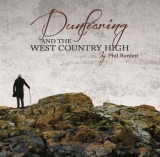 “Dunfearing and the West Country High” – Phil Burdett
“Dunfearing and the West Country High” – Phil Burdett
Phil Burdett’s latest album (on Drumfire Records) was a complete surprise for me. I’d heard Phil play a solo acoustic set a couple of years ago on a night out with the Riot Squad, but this was a completely different beast. “Dunfearing…” is the first part of the “Secular Mystic” trilogy, which should be completed with the release of parts two and three in 2015. It’s an album that sounds gorgeous; you could just sit and let its mix of folk, rock, country and a bit of jazz wash over you, but a little bit of extra effort and careful listening brings out all of the detail that Phil and the musicians have packed in to it; and there’s a lovely tribute to the late Jackie Leven. After reviewing the album, we also managed to grab an interview with Phil during the summer, which is a fascinating insight into a great songwriter.
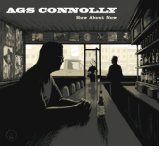 “How About Now” – Ags Connolly
“How About Now” – Ags Connolly
By sheer coincidence, also on Drumfire records, was the debut album from Ags Connolly, “How About Now”, which is now also available in a lovely limited edition vinyl pressing. Ags is based in Oxford but his roots are deep in the American South and his genre is a country offshoot known as Ameripolitan. He takes the outlaw attitude of artists like James Hand, Willie Nelson, Johnny Paycheck et al and gives it a personal twist with some very poignant songs. The album was produced in Edinburgh by his Drumfire labelmate, Dean Owens, and works well with full country band arrangements as well as the powerful solo acoustic guitar backing of the closing song “How About Now” (which was a genuine one-take recording).
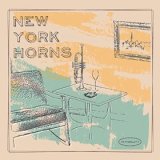 “New York Horns” – New York Horns
“New York Horns” – New York Horns
I know; you’re surprised that I’ve picked a jazz album. Truth is that I love to hear a good horn section, and most horn players away from the day job like to stretch themselves with a bit of jazz. The horns in question are John Isley (saxophone), Chris Anderson (trumpet) and Neal Pawley (trombone), better known as the horn section of The Asbury Jukes, aided and abetted by Jeff Kazee (keys) and Glenn Alexander (guitar). There isn’t a bad, or even a mediocre track on the album and with moods ranging from the blues of “Strollin’ with Sean” through the evocative, mellow “Morningside at Midnight” to the 24-carat soul of “Can’t Stand to See You Cry”, there’s something for everyone.
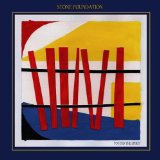 “To Find the Spirit” – Stone Foundation
“To Find the Spirit” – Stone Foundation
And continuing on the soul theme, how about some genuine home-grown English West Midlands soul? Stone Foundation has been steadily building up a devoted following for about ten years now, but “To Find the Spirit” may turn out to be the game-changer for them. The band takes influences from all over the soul spectrum to create a sound very much of this century but which appeals to very disparate groups of fans. The album grabbed me from the first few bars with the Hammond and horns intro of “To Find the Spirit” and impressed from start to finish. After 10 months (and seeing the band live three times), the standout song is definitely “Don’t Let the Rain”, driven along by Neil Sheasby’s slinky bass groove but, again, there’s no filler here.
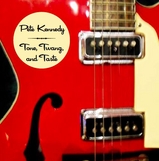 “Tone, Twang and Taste” – Pete Kennedy
“Tone, Twang and Taste” – Pete Kennedy
Now the reason this one’s here is that Pete Kennedy (one half of one of my favourite groups, The Kennedys) decided to pay tribute to the pioneers of the electric guitar prior to the rock ‘n’ roll era; the guys who had grab the interest by using technique and melodic invention rather than volume and a thudding 4/4 beat. Pete is a superb technical musician and “Tone, Twang and Taste” is so obviously a labour of love; every song is played with immaculate attention to detail and they all sound like they were great fun to do, particularly Pete’s ukulele version of “Rhapsody in Blue”. The commercial possibilities for this album were always very limited, and that’s one of the reasons I admire Pete so much for producing something that made me smile from start to finish.
You can read the original reviews of these albums on the site complete with all of the links to the songs on Spotify or Youtube; just type the title into the search box and you’re away. Go on, have a listen; they’re all great albums.
Phil Burdett’s album, “Dunfearing and the West Country High” was reviewed here earlier this year and ever since that time I’ve been waiting for the chance to sit down and have a chat with Phil about his music (and many other things). We finally managed to meet up in Leigh-on-Sea on typically miserable British Bank Holiday weekend and had a pretty expansive chat over a couple of beers. Now that’s the way to do an interview. We covered a lot of ground, so the interview is being published in parts over the next few days.
AM – So Phil, tell us a bit about how you got to be where you are now, musically and philosophically.
PB – I take it you don’t mean the bus route down here. That’s a very good opening question and I’ll do my best to answer it. Musically I would say it’s incremental; it started off with my brother when I was five years old with a guitar and my brother Mick used to have a record collection and he’d lend me his older albums and he was one of those part-time hippies in the late sixties. He went to the Isle of Wight Festival, credit for that, and he had loads and loads of folk music and blues music which was all I heard. Everyone at school was into glam rock and everything so I used to have endless school parties when I was older (obviously not when I was five; great progressive school that would have been). All I would listen to was John Fahey, John Renbourn and probably a bit of the West Coast Neil Young, Topanga County kind of people, James Taylor and those sort of things. And I thought great, this is what’s in the charts, this pop music, then I got school and it was Marc Bolan which was fabulous; I didn’t quite reject everything of my brother’s but I thought, this is what I’m meant to be listening to so I suppose in the early times it was a mixture of Marc Bolan and John Renbourn and then my brother expanded as well into other things like The Band and Van Morrison. Actually, I saw Van Morrison first, although he will tell you different, but I saw him on the Old Grey Whistle Test when he did the “Too Late to Stop Now” thing and they broadcast the whole thing live when they used to do those things, in those days, and I just thought it was music from another planet; I’d never heard anything like it. He had a string section, he had a horn section, he was doing soul music, he was doing blues music, he was doing folky stuff and I can remember a shift happened in my head and I thought ‘this is what I want to do’, and that’s when I wanted to write songs. Not so much to write songs, ‘but I want to make this noise, not to play “Caravan” or “Brown-Eyed Girl”; I want to make this noise with these people. I want to have a bunch of people like this behind me and I want to make this noise.’
AM – Was it the variety of instruments that drew you to it?
PB – It was and, in retrospect, I was quite pleased with that because it was just such an astonishing surprise sometimes you go along to a gig, and you know two numbers in what you’re going to get, whether you like it or not. I like the idea that suddenly you don’t know what’s going to happen next; this could be a folk song, he could pull an acoustic guitar out, he could pull a set of bagpipes out. It could be anything; it could be heavy metal and I loved the idea of that and people like Captain Beefheart. Frank Zappa took it to extremes but I used to love Zappa and probably all the people I’ve liked since that, I’ve liked because of that gig where you thought that anything was possible. You see it now and it flows and it seems like a very good and expansive band playing but at the time I thought that one minute it was classical music, the next minute it was folk music and that’s what I liked it was the variation that made it a whole; it hung together because of the variation. It was astonishing; I sat up after it and I just didn’t know what to do. I wanted to everything but couldn’t do anything.
AM – You mentioned a couple of the musical mavericks there; is there something in you that taps in to that?
PB – I think it all came from that Van Morrison show. Now, I slag off Van Morrison more than anyone does because I think he’s become an appalling thing, an appalling great lump of Irishman. I would rather go and see, and I don’t say this lightly, I would rather go and see a Van Morrison tribute band now than see Van Morrison because it’s the same thing essentially; I think he’s lost the plot or never had the plot and got lucky. His first four or five albums up to “Veedon Fleece” and a little bit beyond were fantastic but suddenly it all went very wrong. When he was inventive and varied, which was probably before I got in to the idea of lyrics, and that’s evolved more than the music side, he was just purely making music and making sounds for the joy of it; I think Van Morrison expresses that if I don’t care about lyrics, because he’s not the greatest lyricist in the world, it’s perfect. “Astral Weeks”, it’s errant nonsense a lot of it but you couldn’t change a word of it. What the fuck is “Veedon Fleece”? What is a Veedon Fleece? But you wouldn’t want it any other way. I’m not religious, I’m an atheist, but I believe that; I want to go and search for the Veedon Fleece when I’m hearing that, so it works. It was that combination of trust in him, you believed in what he did, and his voice, which was peerless at that time. I used to try to do the Van Morrison bit with a bit of Bob Dylan thrown in. My brother tried to get me into Bob Dylan more and I said that Van Morrison was the man, and then suddenly the thing that changed it was Bob Dylan and Robbie Robertson. I heard The Band’s first album and, for no reason whatsoever, I just loved and then I realised that the reason I loved it was because of these words. It’s not the way they were being sung, although that was fabulous, it was these words and I didn’t know what they meant, but they sounded like they meant something and it was probably a combination of those things; Dylan, the Band and Van Morrison.
AM – I was going to come to this a bit later, but the first time I listened to “Dunfearing and the West Country High” I pulled the lyric booklet out and it was obvious that there were an awful lot of lyrics there.
PB – I get hell from record companies for that, especially from the people that type the lyrics out.
AM – But it was doing that and actually reading the lyrics that I realised you’re obviously a writer who is influenced by poetry as well.
PB – In a way, poetry came before lyrics because I used to like poetry before music. When I first heard music, the lyrics were part of the music, of the sound. They could have been singing anything and in some cases they were. People talk about Nick Drake, but I think Nick Drake’s a terrible lyricist. I’ll get crucified for this, but if his music and his sound wasn’t as good as it is, if musically he was someone like Donovan, then the lyrics aren’t that different; it becomes mystical because of the setting rather than the content.
AM – What struck me as well is that the lyrics on “Dunfearing…” actually repay careful listening.
PB – That’s what you want. That’s the reason I want to write short stories, I want to write books, I want to write everything, but I’m writing this music because it’s the only thing I can see, outside of opera, that’s taken seriously (not seriously enough, in my opinion) because it’s a combination of music and lyrics that would not work separately. I’m not a great lover of the idea that lyrics are poetry; I think lyrics are lyrics but they can be good lyrics. Poetry’s another thing; poetry should be able to stand alone. If you have as good a lyric as “Idiot Wind” and Bob Dylan wanted to do that as a poem, I think he would rewrite it, but he shouldn’t rewrite it; it’s got to complement the music.
AM – For the first time in years listening to a new album, I went into sixth form English Literature criticism mode.
PB – My album will be on the curriculum next year; I trust Gove.
AM – You’ve seen the review, it got that reaction because there was so much in there lyrically.
PB – Your review astonished me; my first reaction was that I thought it was a wind-up and that Phil Pavling (described in the sleevenotes as guru and benefactor) had written it or I thought I’d written it and forgotten and posted it to myself. You don’t get that often, you think ‘That’s nice, we’ll use that line for a plug or something’, but this was almost like you knew as much as I did about what was going on, which is very rare.
AM – That was just my natural reaction to the album, really. The other thing was that my wife, who wouldn’t necessarily have chosen to listen to it, being much more into disco, gave it a big thumbs up as well.
PB – My disco album will come a lot later.
And that’s end of part one, more to come very soon, when we get into punk, post-punk and post-post-punk, among other things.
 What a great start we’ve had to 2014. We’ve already reviewed some cracking albums in various genres and now we’ve got another. “Dunfearing and the West Country High” is Phil Burdett’s first album to be released on Twickenham-based Drumfire Records and it’s very, very good. If you’ve seen Phil Burdett play live, you’ll know that he has a powerful, rich baritone voice and is an accomplished acoustic guitar player. He learned to play at the age of six, was in a pre-Depeche Mode band with Martin Gore and has pursued a winding and sometimes messy path through the music scene in the south-east of England ever since.
What a great start we’ve had to 2014. We’ve already reviewed some cracking albums in various genres and now we’ve got another. “Dunfearing and the West Country High” is Phil Burdett’s first album to be released on Twickenham-based Drumfire Records and it’s very, very good. If you’ve seen Phil Burdett play live, you’ll know that he has a powerful, rich baritone voice and is an accomplished acoustic guitar player. He learned to play at the age of six, was in a pre-Depeche Mode band with Martin Gore and has pursued a winding and sometimes messy path through the music scene in the south-east of England ever since.
It’s obvious from the first listen that Phil isn’t just a songwriter; he’s a true poet. You can find any number of musical influences listed in previous reviews but you should probably add James Joyce and Dylan Thomas to that list. A quick word of advice here, don’t download this album, buy the CD; the packaging, designed by Fish Inton, is gorgeous and contains a booklet full of evocative photos and all of the lyrics.
It’s usually a pretty easy job to explain the subject of a song, but it can be a real challenge on “Dunfearing…” as Phil slips sinuously between the mundane and mystical. Even a song as seemingly grounded as “Small Talk at Sullivan’s Diner” descends quickly from the simple narrative to a deeper and darker examination of tortured souls struggling to cope with real life. The songs with a clear narrative thread are inspired by the history of Cornwall and the West Country, “Gothic Miner” and “Fate of Pirates”, for example, while “New York City Call” and “Columbus and Hope” emphasise the area’s historical links with the New World. There’s a batch of songs (“First and Last”, “Song of the Lamp”, “See the Sunset Slow and Beckon True”, “Rimbaud’s Ghost, Chapel Street & Union” and “Winter Halls”) which take inspiration from Phil’s recent Cornish sojourn, and the fatalistic “It’s Where ye Have to Go”.
Which leaves the album’s closing song, “Night Horses of the Wireless Road” to take all of these strands and pull them into an epic, mythical, stream of unconsciousness. The entire album is lyrically dense (both in volume and meanings) and the final song typifies this with references to art, music and fables, before moving abruptly into harsh reality with the news of the death of Jackie Leven, to whose memory the album is dedicated. Musically, “Night Horses…”, has echoes of Neil Young with Crazy Horse at their most laid back or maybe even John Martyn at his best. It has the same unsettling, alienating effect as The Afghan Whigs’ 1996 album, “Black Love”, particularly the closer, “Faded”.
I’m not saying this is an easy listen, but it’s worth putting in the effort. You might even have to do a bit of research on phrases like “mise-en-abyme” (you can look it up for yourself) and some of the more obscure references. Phil’s rough-hewn baritone voice and acoustic guitar (with a hint of Johnny Cash at times) are sympathetically supported by John Bennett (guitars), Steve Stott (mandolin/fiddle), Russ Strothard (bass guitar), Jack Corder (drums), Dee Hepburn (piano), Colleen McCarthy (backing vocals), Wag Porter (fiddle) and Mark Elliott (percussion) throughout the album; the playing isn’t particularly showy, but it creates a perfect backdrop for the modern folk and slight country leanings of the songs.
If you want a particularly geeky fact to impress your friends with, there are nearly thirty drinking references in the album’s lyrics, including pub names, drink names and general drinking terms, including one reference to rehab; you can take what you like from that, but I’m guessing that Phil enjoys a beer. This is an album which visits some very dark places, but closes with a heartfelt farewell to a fellow troubadour as part one of the proposed “Secular Mystic Trilogy” closes.
Out Monday March 3rd on Drumfire Records (DRMFR016).


